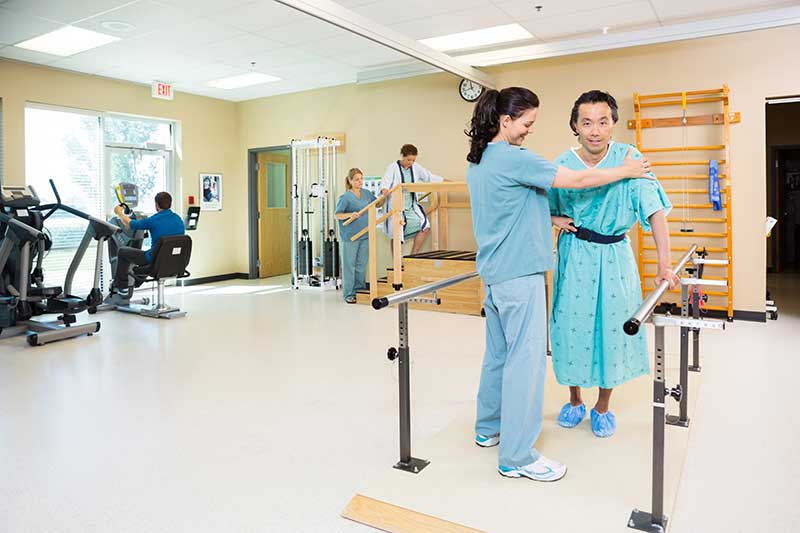Do you have a question, “What does a physical therapist aide do?” Learn their day-to-day duties, the importance of their therapy support, and how they contribute to patient care and rehabilitation.
Physical therapy is integral to healthcare, providing vital services that help patients recover, manage pain, and improve mobility. While physical therapists and assistants often receive much of the spotlight, physical therapist aides (PT aides) are crucial in ensuring that the therapy sessions run smoothly.
What Does a Physical Therapist Aide Do? A Comprehensive Overview
If you’re a healthcare student considering a career in physical therapy, understanding the role of a physical therapist aide can guide you in determining if this career path aligns with your professional aspirations.
The Role of a Physical Therapist Aide
Essential Responsibilities
PT aides are responsible for various non-clinical tasks within a physical therapy clinic or hospital setting. Their day-to-day responsibilities typically include:
- Preparing treatment areas by setting up therapy equipment and cleaning treatment spaces.
- Assisting therapists and assistants with non-medical tasks during treatment sessions.
- Transporting patients to and from treatment areas.
- Managing clerical duties, such as scheduling appointments, answering phones, and managing patient records.
- Providing general support to ensure the clinic or therapy environment operates efficiently.
PT aides work under the direct supervision of physical therapists or assistants and do not perform the actual therapy. However, their presence is indispensable for a seamless and effective therapy experience.
Educational and Certification Requirements
Most entry-level positions for PT aides require a high school diploma or equivalent, making it an accessible career choice for those straight out of high school. On-the-job training is typically provided, so previous healthcare experience, while beneficial, is optional. However, some states and employers may have additional requirements or prefer candidates with certification in CPR or basic life support.
The lack of stringent educational requirements makes the role an excellent stepping stone for healthcare students to gain hands-on experience in a clinical environment while they complete their education in physical therapy or other allied health professions.
The Skillset of a Successful PT Aide
A well-rounded PT aide will possess a blend of interpersonal, organizational, and practical skills, including:
- Strong communication and listening abilities to effectively interact with patients, therapists, and other team members.
- A compassionate and patient demeanor, especially when working with patients who may be in pain or frustrated with their recovery progress.
- Being physically fit to assist with moving patients and equipment.
- Good organizational skills to manage administrative tasks and maintain a tidy workspace.
- A detail-oriented mindset to follow protocols and assist with accurate record-keeping.
These soft skills are fundamental and can often be the differentiator in providing high-quality patient care and ensuring the physical therapy practice runs like a well-oiled machine.
A Day in the Life of a PT Aide
To give you a clearer picture, imagine a typical day for a PT aide at a busy clinic. The morning might start with setting up exercise stations and equipment before the first patient arrives. Throughout the day, the aide greets patients, helps them move to the appropriate treatment area, and ensures they’re comfortable.
Between appointments, they might clean used equipment, update patient records, stock treatment supplies, and answer phone calls. An aide’s ability to manage these tasks promptly directly impacts the number of patients the clinic can see and treat daily. The PT aide might also spend time demonstrating or explaining the correct way to use equipment or perform certain exercises as directed by the supervising therapist.
Challenges and Rewards of Being a PT Aide
The job of a PT aide can be physically demanding and sometimes emotionally taxing. Aides are often on their feet for most of the day, moving equipment and supporting patients. Additionally, they may encounter patients experiencing significant pain or frustration, which requires a high level of empathy and emotional resilience.
However, the position also offers unique rewards. PT aides can take pride in helping patients make progress, often observing improvements they have facilitated through their support over time. Furthermore, for healthcare students, working as a PT aide provides invaluable insights into physical therapy, patient interaction, and the inner workings of a healthcare facility.
Career Advancement Opportunities
Working as a PT aide offers several pathways for career advancement. Some aides choose to further their education and become physical therapist assistants or licensed physical therapists. These roles involve more direct patient care, greater responsibility, and, typically, higher compensation.
For those interested in the administrative side of healthcare, experience as a PT aide can pave the way for roles in medical office management or clinical coordination. Skills and knowledge gained in this entry-level position provide a solid foundation for nearly any healthcare career.
The Evolving Scope of Physical Therapy Aides
As the healthcare industry continues to evolve, the scope of PT aides‘ work may also change. With advances in technology and the ongoing push for efficiency in healthcare delivery, aides may take on new responsibilities, particularly related to digital health records management and telehealth services. Adaptability and a willingness to learn new skills will be key as aides continue supporting physical therapy teams in various settings.
Conclusion
Physical therapist aides hold a fundamental but often understated role within physical therapy. Their contributions to maintaining clinic operations and supporting patients and therapists are invaluable. For healthcare students, entering this field could serve as both an enriching experience and a stepping stone to a broader career in health services.
The physical therapist aide profession demands dedication, organization, compassion, and a genuine interest in patient wellbeing. Those who choose this path can look forward to a dynamic, people-oriented work environment and the opportunity to impact individuals’ lives every day positively.
If being a PT aide sounds like the right fit for you, it’s worth exploring this career further. Consult with academic advisors, seek out job shadowing opportunities, and connect with professionals in the field to learn more about what it takes—and how it feels—to be an integral part of a physical therapy team. Your proactive steps today could lead to a fulfilling career in tomorrow’s essential healthcare segment.




